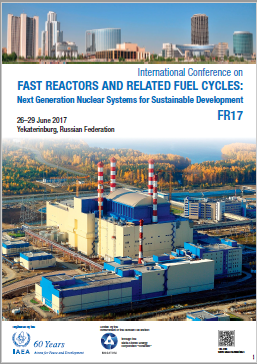Speaker
Mr
Francesco Lodi
(University of Bologna)
Description
One of the crucial objectives for the Advanced Lead-cooled Fast Reactor European Demonstrator (ALFRED) is proving the viability of the general concept adopted in the design. This proof passes through the successful operation of ALFRED, demonstrating that the design assumptions provide not only the foreseen performances, but also the aimed reliability. The demonstration of the reliability can be rephrased stating that the margins assumed for the design must be proven to be well suited, in the sense they accommodate the uncertainties on the main technological constraints. This, indeed, was the aim of the task "ALFRED core safety parameters and influence of model uncertainties on transients" in the collaborative project “Preparing ESNII for Horizon 2020” (ESNII+), co-funded by the EU within the 7th EURATOM Framework Programme, where the first step, object of this work, was the evaluation of data, model, fabrication and measurement uncertainties and their effect on the fuel assembly temperature field.
The paper present first the identification of the various factors contributing to the overall uncertainty on the temperature field; then, the propagation of each effect, by means of the heat equations, so to retrieve the actual uncertainties on the parameters of interest (the temperatures themselves) and finally, a hot spot analysis to quantify the uncertainty-distorted temperature field. The hot spot analysis has been performed by means of a semi-statistical vertical approach – characterized by an optimal degree of conservatism among the classical approaches – targeting a 3σ (99.73%) confidence interval.
The performed analysis has highlighted the importance of fabrication tolerances, especially on the assessment of the coolant bulk temperature, and of data/models especially on the clad outer, gap and fuel temperatures evaluation, pinpointing the research areas where more efforts are needed.
The further step is the application of the present analysis to unprotected transients, combined with the uncertainties on the reactivity coefficients, so to gain a real insight on the safety performances and degree of forgiveness to be reckoned to ALFRED.
Country/Int. Organization
Italy
Author
Mr
Francesco Lodi
(University of Bologna)
Co-authors
Mr
Davide Mattioli
(Italian National Agency for New Technologies, Energy and Sustainable Economic Development (ENEA))
Dr
Giacomo Grasso
(Italian National Agency for New Technology, Energy and Sustainable Economic Development (ENEA))

